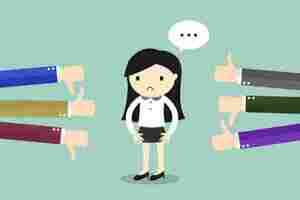Social media adds 24/7 emotional burdens
With 2 billion monthly active users and counting, there’s no doubt that Facebook has changed a lot about how we connect with others… for better and for worse.
Keeping up with all of these sites, followers, and random relatives is a lot—especially if you’re already working full-time.
Guilt sets in when you fail to wish that high school friend a happy birthday. Maintaining a polished professional appearance is more than doing your job — you need to connect with people on LinkedIn — and be active and relevant enough that you show up on peoples’ feeds.
That’s a lot of “work” that in most cases, no one is paying you for. In other words, emotional labor.
Facing the fallout of emotional labor on social media

What is emotional labor?
The term emotional labor has actually been around since the 1980s. Coined by sociologist Arlie Russell Hochschild in her book, “The Managed Heart: Commercialization of Human Feeling,” the author looks at the difference between someone working with their hands all day in a factory with a flight attendant, who sure, walks the aisles and pushes drink carts, but the bulk of their job is about making people feel taken care of.
These days, we hear the term in relation to the workplace and the extra workload often placed on women. It usually refers to all of the unpaid work that someone might perform behind the scenes. Or the person who plans the office party or cleans up or does the scheduling for the family. You get the idea.
While social media has made some parts of our emotional workload more convenient, it’s brought on some new ways to drain our empathy reserves.

Social media worse for mental health than we thought
Here are a few ways that “always on” connectivity can leave us feeling depleted:
The expectation of the personal brand

These days, it feels like everyone is trying to stake a claim on LinkedIn since there’s now this idea that we need a consistent, professional personal brand.
There’s nothing wrong with this idea, but developing content outside of your regular job is overwhelming to be sure.
Spending time curating your “brand” is stressful. Unless you’re paid to write online content or “influence” for a living, these efforts are largely unpaid. And, when people turn themselves into brands, there’s an added pressure to put more thought into every tweet, making sure they stay on message 24/7.
If you’re looking for a career change or more visibility in your field, developing your online presence is essential. But, if you’re happy in your current position, we recommend keeping your online activity clean (no party pics) and updated.
You can always revisit your brand down the road when the time comes.
Social media at work: pros, cons, and is it necessary?
Superficial relationships are a time suck
Another reason we feel burnt out may have to do with a greater emphasis on quantity than quality. The average Facebook user has about 338 friends , but studies have shown that the more connections you have, the more likely you are to be stressed .
There’s also the perfectionism factor. Appearances are everything on social media, and with that comes significant pressure to present this curated life. So, rather than share authentic feelings — it’s all just a competition.
Studies have shown that young people who spend more than two hours a day on social channels are more likely to report feelings of despair. While most of the coverage has looked at the effects of social media on teens, we’re all susceptible to feelings of inadequacy.
Instagram guide for parents
A constant parade of promotions, vacations, and delicious, healthy meals can promote those same feelings you’d get talking to a frenemy at a party — social comparisons on steroids.
And then there’s the issue of social media angst . Psychology Today wrote a piece that looked at the effects of inadvertent slights or failing to follow someone back.
While wondering who your friends “really are” doesn’t equate to any actual work on your end, it certainly stirs up unnecessary negative feelings.
How to stay positive when social media brings you down
Social media fatigue is a thing now, too
According to this article in the Chicago Tribune, Instagram, Facebook, and Twitter are making us tired . The Tribune interviewed one doctor who said they’ve noticed that several patients complaining about tiredness spent a great deal of time on social media.
Social media can make some people feel anxious and overwhelmed at everything happening in the world — or their smaller world filled with personal politics, complaints, and comparisons to others.
This Guardian article highlights some of the “ millennials who don’t use social media ,” and quotes a social worker who found that using social media on top of her demands at work was just too draining.
Like the old-school definition of emotional labor, sometimes watching emotional reactions play out online can wear us out. And it makes sense. Before social media came along we only had to deal with our friends’ feelings and opinions when we saw them in person.
6 social media apps that are better than Facebook
However, social media makes some things easier
Where we might be spreading ourselves thin over personal branding attempts and toxic feeds, social media has done us a lot of good in terms of cutting back on some of our “personal admin tasks.”
We don’t have to knock on doors to invite people to a party or send out invitations and wait for the RSVPs to come back to us like a formal boomerang.
Now, wishing someone a happy birthday is a click away — no postage required. If you want to host an event, plug in the details and boom— all your friends have the info.
Wrapping Up
If you’re feeling burnt out, taking some time to pare down your digital activities might just do you some good. We recommend taking a look at this article from TEDx speaker and entrepreneur, Dr. Pragya Agarwal. She’s put together some tips for managing the dread and anxiety associated with social media marketing — but they’re applicable to your personal life, too.
It’s also worth acknowledging that we’re currently in the middle of a massive social undertaking — a transitional phase in etiquette if you will.
Social rituals have always been a lot of work, the difference now is, there’s an expectation to engage 24/7. But, as new norms sort of “gel” into place, chances are, we’ll be able to define a clear sense of boundaries moving forward. For now, though, we’ll have to establish them for ourselves.